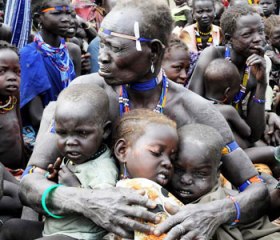IOM returns Ugandan children trafficked to S. Sudan
March 23, 2013 (JUBA) – At least five Ugandan children, who were victims of human trafficking in South Sudan, have been returned to their country, the International Organisation for Migration (IOM) said.

The Ugandan community in Juba, IOM said in a statement, on learning about childrens’ plight notified their embassy, whose officials contacted the organisation for assistance.
“The children were flown back to Uganda on Tuesday, where they were met by IOM staff. Some of the children are being reunited with their families, while the others were provided with shelter through a local NGO,” partly reads the statement.
The older children will be offered vocational training opportunities based on their interests, so that they will be able to support themselves in Uganda, it added.
The support for the return and reintegration of victims of trafficking, the organisation said, is provided through IOM’s Global Assistance Fund (GAF); an emergency support mechanism that provides case-specific assistance to victims of human trafficking.
Human trafficking, anecdotal evidence indicates, is reportedly on the rise in the new nation’s urban centers. In August 2012, for instance, IOM says it assisted two teenage victims of trafficking from Kenya who had been forced into domestic servitude in Juba.
South Sudan, according to the latest US Department of State’s Trafficking in Persons (TIP) report, is reportedly classified as a “Tier 2 Watch List” country; an indication that the country does not comply with the minimum standards for the elimination of trafficking.
“South Sudan is a source and destination country for men, women, and children who are subjected to forced labor and sex trafficking,” the 2012 reports says, citing women and girls, particularly those from rural areas or those who are internally displaced, as being vulnerable to forced labor.
The young nation, the report adds, still lacks adequate mechanisms to prosecute those involved in trafficking and protect victims, but acknowledges efforts are on course to do so.
Meanwhile, IOM says it is working with the government to address the country’s “lack” of legal, medical, psychosocial and referral services for victims of trafficking.
The organisation has reportedly appealed for funds to conduct a baseline assessment to determine the current extent of cross-border and internal trafficking in South Sudan.
“A key area of IOM support is building the government’s technical capacity. IOM works closely with the Ministries of Interior, Justice and Foreign Affairs to train immigration and police personnel in identifying and assisting victims of trafficking, as well as the effective prosecution of traffickers,” further says the statement.
(ST)
